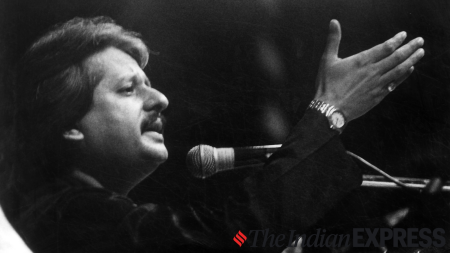In the 1980s, when ghazal, one of the most popular expressions of Urdu poetry, rose to the Indian musical stage, a poignant nazm describing a father’s emotions after receiving a letter from home plumbed the depths of a nation’s heart.
Chitthi aayi hai moved millions, especially the diaspora, to tears. When they heard the lines “Tune paisa bohot kamaya, iss paise ne desh chhudaya… (You’ve earned a lot of money, it made you leave your country)”, “Desh paraya, chhod ke aaja, panchhi pinjara tod ke aaja… (Leave this strange country and come back, break this cage, O bird, come back)”, many wept, their tears of longing taking them to homes and memories they had left behind.

Pankaj Udhas, who poured his heart into these lyrics by Anand Bakshi in Mahesh Bhatt’s Naam (1986), passed away after months of battling pancreatic cancer, at Mumbai’s Breach Candy Hospital on Monday. He was 72.
Udhas is survived by his older brothers Manhar and Nirmal, wife Farida, and daughters Nayaab and Rewa.
“With a very heavy heart, we are saddened to inform you of the sad demise of Padmashri Pankaj Udhas on 26th February 2024 due to a prolonged illness,” his daughter Nayaab wrote in an Instagram post. The singer’s last rites will be held Tuesday.
President Droupadi Murmu and Prime Minister Narendra Modi were among those who mourned the singer’s death.
“He was a beacon of Indian music, whose melodies transcended generations. I recall my various interactions with him over the years. His departure leaves a void in the music world that can never be filled. Condolences to his family and admirers. Om Shanti,” Modi wrote on X.
While it may seem exaggerated in today’s times, after Chitthi aayi hai, there were several stories those days of people returning home from abroad, while many others were steered towards a feeling of yearning to see their loved ones. It was this ‘Chitthi aayi hai effect’ that propelled Udhas, despite his relatively quotidian voice, to a significant stature at a time when the world of ghazals was ruled by Mehdi Hasan, Ghulam Ali and Jagjit Singh among others.
Born in 1951 in Jetpur, Gujarat, Udhas came from a music-loving family. His father, a farmer, played the dilruba and encouraged his three sons Manhar, Nirmal, and Pankaj to imbibe a deeper understanding of music early on.
At 12, Udhas began to learn tabla at the Sangeet Natya Akademi in Rajkot. It was here that he felt inclined to learn vocal classical music. By then his elder brother Manhar, a mechanical engineer and a singer, had moved to Mumbai and was assisting composers Kalyanji Anandji in their recordings.
Since Manhar was in Mumbai, the family also moved there, and Udhas began learning from Master Navrang Nagpurkar, a well-known vocalist and guru from the Bhendi Bazaar gharana, who also taught Asha Bhosle, Suman Kalyanpur and Pandit Jitendra Abhisheki, among others.
While studying science at St Xavier’s, Udhas was exposed to the ghazals of Begum Akhtar, masterpieces in the ghazal circles and considered the epitome of this gayaki still. Fascinated, Udhas decided to learn Urdu and its diction and pronunciation from a ‘Maulvi saab’ who was also teaching his brother, who by now was singing in Hindi films.
Before his first ghazal album Aahat hit the market in 1980, Pankaj along with Manhar and Nirmal formed a band, Fabulous Three Brothers, performing all over Mumbai along with an orchestra. One of these shows was attended by veteran composer Usha Khanna who suggested Udhas’s name to filmmaker BR Ishara, known for Rehana Sultaan starrer Chetna (1970), who wanted a new voice for his upcoming film. Udhas cleared the audition and sang Tum kabhi samne aa jao, a ghazalnuma piece for Ishara’s Kaamna (1972).
While the song was well-received, this was the time when filmmakers weren’t amenable to new playback singers and relied on big voices of the time such as Mohammad Rafi, Lata Mangeshkar, Kishore Kumar, and Manna Dey for the success of their films. These were strenuous times for Udhas, who at one point decided to leave everything and move to Canada.
But two things kept the singer of longing and heartache going – his affection for ghazal, and the big audience for the art form in the US, UK and Canada, where he kept performing regularly.
In the early 80s, when ghazal as a genre was at its peak, often finding more appreciation than film music, Udhas released two ghazal albums – Aahat (1980) and Nayaab (1985) — which found much attention, but the pinnacle of fame came with Chitthi aayi hai. Jeeye to jeeye kaise in Saajan (1991), Mohra (1994), Chandi jaisa rang hai tera (2001), and numerous concerts all over the world, only kept this popularity in place. In 2006, Udhas was awarded a Padma Shri.
Udhas also created Ahista, a gentle ditty that found attention in the 90s indie pop phase, which ended with the arrival of the internet and a resurgence of Bollywood music. He was also the founder of a ghazal festival, Khazana, and performed at ghazal concerts regularly until last year, when he stopped owing to his illness.
In Udhas’s passing, the country has lost a voice that “evoked millions of emotions,” said Yash Raj Films.
Disclaimer: The copyright of this article belongs to the original author. Reposting this article is solely for the purpose of information dissemination and does not constitute any investment advice. If there is any infringement, please contact us immediately. We will make corrections or deletions as necessary. Thank you.







